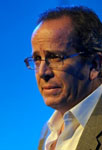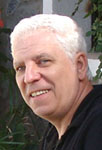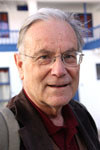Perspectives of the “Buen Vivir”
Tuesday, July 17
Venue: University of Vienna, AudiMax, Dr. Karl-Lueger-Ring 1 - renamed "Universitätsring", 1010 Vienna
Keynote: The Buen Vivir, beyond development
Keynote Speaker: Alberto Acosta, FLACSO Ecuador
Tuesday, July 17, 2.30 p.m. - 3.30 p.m.
Latin America, based on a renewed criticism on the conventional development, finds itself in a process of reunion with its origins. On the one hand, it is maintaining and recovering an historic tradition of criticism and issues that have been produced and presented from this region a long time ago, but that fell behind and are in danger of being forgotten. On the other hand, there are emerging other conceptions, above all originally owned by the ancestral people and nationalities of the Abya Yala, as well as also from other regions of the Earth.
Its most known expressions refer to the constitutions of Ecuador and Bolivia: the Buen Vivir or sumak kawsay (in kichwa), the Vivir Bien or suma qamaña (in aimara) and also sumak kawsay (in quechua). In addition to these visions, there are other approximations to philosophical thoughts, in some way related to the search for the Buen Vivir, including philosophical visions in different parts of the planet. The sumak kawsay, as life culture, with different names and varieties, has been known and practiced during different periods in different regions of the Mother Earth: elements of the “vida buena” (good life) from Aristotle could be retrieved. So, the Buen Vivir is neither a peculiarity nor a novelty regarding the political processes at the beginning of the XXI century in the Andean countries. The Buen Vivir is part of a long search for life alternatives forged in the heat of the fights of Humanity for emancipation and life.
With its postulation of harmony with Nature, with its opposition to the concept of perpetual accumulation, with its return to values of use, the Buen Vivir, as an open proposal and under construction, opens the door for formulating alternative life visions. In short, the Buen Vivir proposes a civilizing change.

Alberto Acosta Espinosa
was born in Quito on the 21st of July 1948. He realized studies of Economic Geography and Economics (specialization in Energy Economics) in the Federal Republic of Germany (BRD) (1974-79). He acknowledged his Economist title in the Faculty of Economics of the Pontificia Universidad Católica del Ecuador (1981). At present (since 2008) Professor – researcher of the FLACSO. Coordinator of the Análisis de Coyuntura política, social y económica (Analysis of political, social and economical Conjuncture). Energy and Mines minister, January - June 2007; President of the Constituent Assembly, in Montecristi, Manabí, from 29 November 2007 to 24 June 2008 (Conventioneer till 24 July 2008).
Roundtable
"The Buen Vivir as answer in the multiple crisis?"
Tuesday, July 17, 3.30 p.m. - 5 p.m.
There is a contradiction with respect to historical and actual developments: The well-being of societies and the political space for the state are based very much on economic growth. However, the dominant pattern of growth and the unintended consequences of industrialism lead more and more to environmental degradation and in many cases not to well-being. At the international level, a debate started about more comprehensive understandings of well-being. Moreover, ICA takes place right after the Rio+20 conference on sustainable development and a „green economy“ in June 2012. In some Latin American countries, intense debates and related policies take place around the concept of a good life (el buen vivir o vivir bien). What does this mean, given the fact that the economic model in Latin America is still an extractivist one and that production and consumption patterns worldwide are still mainly unsustainable? What can we learn from these debates and experiences? What are implications for research and teaching?
Roundtable Participants

Eduardo Gudynas, Centro Latino Americano de Ecología Social (CLAES)
Montevideo, Uruguay, 1960. Eduardo Gudynas is Executive Secretary of the CLAES (Latin American Center of Social Ecology) / D3E (Development, Economy, Ecology, Equity Latin America). Master in social ecology. His work area aims at sustainable development strategies in Latin America, with special emphasis on the conservation of nature, the situation of rural areas, and the limits and possibilities offered by regional integration and globalization for reaching sustainability. He is Duggan fellow of the Natural Resources Defense Council (USA), was visiting researcher in the National Wildlife Federation (USA), and has been expert in the Programa de Desarrollo Local Sostenible Amazónico (Program for Amazonian Local Sustainable Development) in the six countries of the Amazon basin by the Friedrich Ebert Foundation. From CLAES he integrates the coordination of the Red Latinoamericana y Caribeñaen Ecología Social (Latin American and Caribbean Social Ecology Network), and supports the Alianza Latinoamericana de Estudios Críticos sobre el Desarrollo (Latin American Alliance for Critical Development Studies ).

Joan Martinez-Alier, Universitat Autonoma de Barcelona
Barcelona, 1939. Professor of Economic History and Institutions at the Dpt. of Economics and Economic History, Universitat Autonoma de Barcelona, since 1975 & Institute of Environmental Science and Technology (ICTA), UAB, Director, Doctoral Programme in the Environmental Sciences (Ecological Economics and Environmental Management) (1997-2008).
Past positions: Student (1963-66) and Research Fellow, St.Antony's College, University of Oxford (1966-73). Visiting fellowships or professorships:Universidade Estadual de Campinas (S. Paulo), 1974, Freie Universität Berlin, 1980-81, St.Antony's College, Oxford, 1984-85, Stanford University and Univ. California (Davis),1988-89, FLACSO, Ecuador (1994-95, 2007, 2011-12), Yale University, 1999-2000.

Ana Esther Ceceña, Universidad Nacional Autónoma de México
Third Cycle Doctorate in International Economic Relations by the University of Paris I-Sorbonne. Tenured Researcher of the Instituto de Investigaciones Económicas at the Universidad Nacional Autónoma de México. Line of work: natural resources, social movements, militarization and worldwide hegemony. Director of the Observatorio Latinoamericano de Geopolítica (Latin American Observatory of Geopolitics) (www.geopolitica.ws). Member of the Polarization Project, coordinated by Immanuel Wallerstein, since 2006.Coordinator of the working group Hegemonías y emancipaciones (Hegemonies and Emancipations) of the CLACSO (Latin American Council of Social Sciences), 2000 - 2009. Member of the REDEM (Network for the Study of the World Economy) and of the Red de Economía Global-Global Economy Network (REG-GEN).Director of the magazine Chiapas, 1994–2004. Teacher of the postgraduate course in Latin American Studies at the Universidad Nacional Autónoma de México. Member of the Jury for the Premio Libertador al Pensamiento Crítico (the Liberator's Award for Critical Thought), 2010.

Gabriela Kütting , State University of New Jersey
Gabriela Kütting is Associate Professor of Political Science and Global Affairs at Rutgers, the State University of New Jersey, Newark campus. Her research interests lie in the field of environment and global political economy with particular emphasis on the study of global equity, consumption and nature-society relations. In global environmental politics, the large bulk/mainstream of the literature focuses on issues in global environmental governance and its organization as the causal factor around which problems are defined and solutions found. As a critical counterpoint, Gabriela Kütting argues that the causes of environmental degradation (and therefore its solutions too) can be found in the social and structural origins of an environmental problem. Thus it is imperative to understand the historical dimension of environment-society relations or the interplay between environment and economy over time. True sustainability requires a just society and an equitable distribution of environmental goods and bads.
Moderation: Ulrich Brand, University of Vienna
Ulrich Brand (born in 1967) is Professor of International Politics at the Institute of Political Science at Vienna University (Austria). He studied Political Science and Economics at Goethe University in Frankfurt, Humboldt University in Berlin and the Universidad de Buenos Aires. He earned his PhD at Frankfurt University in 2000. In April 2001 he started as an Assistant Professor at Kassel University (Germany) in the Area of Globalisation & Politics and worked as a Visiting Scholar in 2001 at the UNAM in Mexico City, in 2003 at York University (Toronto), as a Visiting Professor in 2005 at Rutgers University (New Jersey) and in 2006/2007 at the University of Applied Sciences in Bremen. He has published on Global Governance and International Political Economy, state and regulation theory, NGOs and social movements in international politics and on environmental politics as well as on Latin America. He is member of the international research group “Alternatives to Development” (coordinated in Quito) and expert member of the Enquete Commission “Growth, Well-being and Quality of Life” of the German Bundestag.
